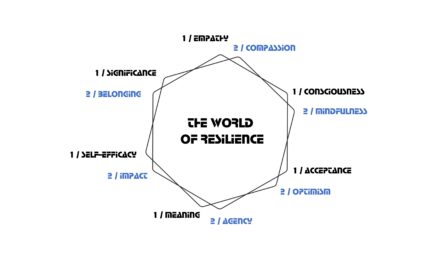“What is your mission in life? Do you have a purpose?” I don’t really like those questions. I very much associate them with a faster, higher, further on a pseudo-spiritual level. Why can’t I just be in this world without having to achieve anything special? For me – and many other people – the very idea of having to fulfil some supposed mission in life creates stress, fear or even crises. Maybe you are one of them too …
However, what we certainly have in common as humans is the search and pursuit for meaning in our lives. We want the things we do to have meaning – or at least to make sense. If there is a lack of this perceived meaningfulness, it will be difficult to develop motivation and energy for a particular task. We then often only go after things because we are asked, disciplined or even forced to do so in some form from the outside.
So what does meaningfulness have to do with motivation, commitment and passion? And why do we lose energy when we find parts of our actions or life meaningless?
In order to answer these questions, we first have to find out what we mean by meaningfulness – or when we experience something as meaningful? Experiencing or perceiving mainly because it is something very individual and subjective. What seems sensible or meaningful to me may be perceived completely differently by another person – even if there may be a consensus about it in certain aspects.
So let us first look at how the collective and individual levels of sense-making and meaningfulness can be differentiated. The levels with the greatest intersections are probably those that relate to general questions of ethics and morality. So most people will probably consider it sensible that we as human beings do not kill each other and do not harm each other in any other way, if possible. It is a matter of social consensus. The question of whether one should kill and eat animals, on the other hand, will be answered in a much more polarised way. One person doesn’t mind, while for a vegetarian or even vegan it is probably highly meaningful not to do it and not to consume animal products. So here we are already on a more individual level. If we go one level deeper, there will be people who find it meaningful for themselves to meditate or do yoga every morning, while others maintain a large stamp or stone collection or run an incredibly large model railway.
So what I consider meaningful for me depends largely on my individual personality, attitude and preferences. And we should ideally not judge it in relation to others. Because we are probably all a little weird or quirky in our own special way – or better, different.
Nevertheless, the individually perceived meaningfulness is extremely important for how we deal with the issues and tasks in our lives and how we feel about them!
And that brings us to agency … To put it a bit bluntly: If we find something really meaningful, it gives us a lot of motivation and agency. Then we speak of passion, or that we “burn” for something. Thus, sense-making and meaningfulness lead us to believe that what we are doing or what is necessary to realise a goal has a benefit or changes something for the better. That’s why we engage in it or make something our own. Best case, the creation of meaning releases undreamt-of forces and leads us to enjoy doing something – or to do it anyway, even though we may not really enjoy doing it.
And why are perceiving meaning and taking agency important for building resilience?
Mainly because it has a very negative influence on us when we consider something as notmeaningful or even pointless. This occurs especially when the trigger to do so comes from outside and we are asked, disciplined or even forced to do so, even though we do not want to do so or consider it sensible.
In many cases, this amounts to a total loss of energy. We then can’t motivate ourselves. We agonise. We shirk the tasks “demanded” of us. We don’t enjoy it at all. We get bad tempered. We nag and may even get aggressive. And in the end the “wrong people“ suffer from it too.
So we enter a kind of downward spiral of negative emotions that stresses us out, causes anxiety and can even trigger veritable crises up to burnout. Because a burnout (or better a depression of exhaustion) always equals a crisis of meaning.
For this reason, in order to strengthen our resilience, it is important that we are always aware of what we do (see also consciousness) and question everything that makes up large parts of our lives (work, relationships, etc.)and try to do and allow only what seems to make sense and be meaningful to us.





